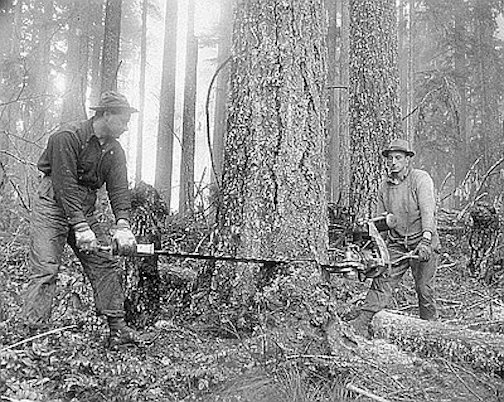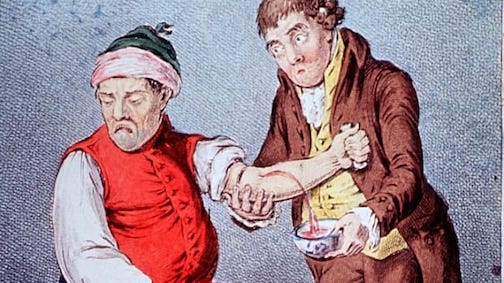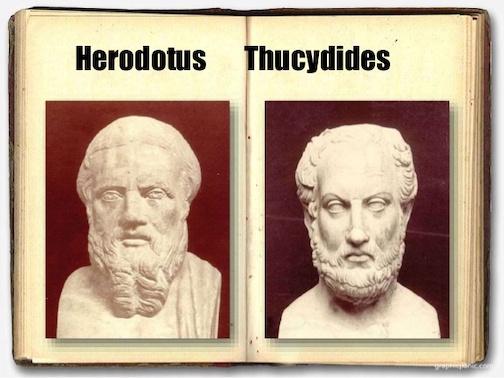Displaced workers retire? From what?
Ask a Coos Bay logger about it, or a Charleston commercial fisherman.
What did they retire from?
Getting jacked around by new ideas on sustainability.
My Grandfather on my mom’s side worked in the woods before automation, before chainsaws.
He said it was quiet and the men worked at a pace.
With the advent of chainsaws the pace quickened.
“We knew what we were doing was harmful to the environment, but we had a job to do.”
That’s what he had to say about clear cutting and stream destruction.
He said the only time he felt safe on a job was getting drafted into World War II.
How bad ass are loggers?
“Grandpa, why weren’t you drunk and rowdy in town on Saturday nights?”
“I’ve seen enough of where that leads and I didn’t want any part of it.”
He may have been afraid of Grandma, too. Everyone else was.
When Grandpa retired he wanted to open an electronics store.
Grandma said no, and that was the final answer.
Displaced Workers Miss Their Work?
I met an older married couple, high end professionals in retirement.
Both doctors, one was getting into their retirement, the other missing the excitement of the medical profession.
Both were aged out displaced workers, but one knew how to move on.
I said I understood how hard it is since I was an Army medic for two years.
They weren’t impressed after spending a decade in training to my three months.
One reason it’s hard to make new friends when you get older?
Accomplished people enjoy talking to other accomplished people and compare careers.
Doctor to doctor is good.
Doctor to Army medic? Not so much.
I work hard to be as ordinary and run of the mill as possible at the start to see who I’m talking to.
To be honest it’s not that hard.
How hard is it for highly educated, highly specialized strangers, to mix with the rabble?
More difficult than it is for the rabble who are sensitive to others feeling like they’re better than them?
The good doctors and I had one thing in common, dogs of the same breed.
It seemed like they thought their dog was better than mine, which checks out for high enders.
They were probably as stunned as me that I’ve been living in the same neighborhood.
Though I’ve lived here longer, they seemed more at home in their dream house.
Somehow I struggle along with my smart wife who I ought to sic on them.
She loves meeting new people.
Displaced Workers In History
Where did all of the workers who built the ancient Egyptian pyramids go?
In 1990, a number of humble gravesites for pyramid workers were found a surprisingly short distance from the tombs of the pharaohs. Inside, archaeologists discovered all the necessary goods that pyramid workers would need to navigate passage to the afterlife — basic kindnesses unlikely to have been afforded common slaves.
They died and were buried on the job, but not slaves?
How about the people who built Ancient Greece and Rome?
Aristotle described slavery in Ancient Greece as natural and necessary. For Aristotle, a slave was “living property” (in Greek, κτήμα έμψυχον). That indeed was the collective mindset at the time.
Thank you, Aristotle.
He might be surprised to know that the people who built America are still living here and working it out, unlike his time.
The hard part is trying to understand the modern morons who can’t pronounce Aristotle having in-depth knowledge of a history unknown to them.
It usually begins with, “Like my daddy says, and his daddy’s daddy before my daddy says, we weren’t doing anything wrong.”
History is funny like that, on what persists as ‘THE TRUTH.’
2
After twenty years of history work I joined the ranks of displaced workers.
It was the best job, a career job.
Then the career people showed up, itinerant career people from out of state who didn’t care about history as much as they cared about their ‘careers.’
One wheezy career man made the rules for those culled from the staff to make room for career professionals like himself.
He explained it like this:
“If you stay you’ll need to sign papers agreeing to your automatic dismissal based on your supervisor’s reports and department head’s opinion.”
Yeah, uh, no.
Followed by:
“If you sue us we will fight you in court to deny any claims of compensation, unemployment payment, or bonus.”
They’d already been sued and lost and learned some legal lessons.
3
I hadn’t planned on legal action until he mentioned it.
“If you leave now it will be a clear path with the unemployment process and a bonus based on your years of service.”
Since my supervisor was a weak link new to the staff, my department head ethically compromised, and the big dog talking to me more than willing to suck up to his new boss, I read the writing on the wall.
That evening, after a long talk with my wife, after we added up the positives and negatives, and after I spoke to an attorney, I took door number three.
In short order I stood in the same office I stood the day I was hired twenty years earlier.
Back then I was interviewed by a titan of the historical industry who understood how to hire for short term jobs that turn into long term based on ability and aptitude.
He knew how to build a staff and develop a team.
Under his leadership I rose in the ranks, finished a history degree, and rebuilt long term artifact storage.
Twice.
4
Then he retired to open the gates to mercenary types, retreads, has beens, and never was fakes.
History people are different than museum people, which might seem odd. One is object driven, the other career driven.
During a time of displaced workers around me, I transitioned smoothly.
I picked up my work stuff in a basement garage at six in the morning to avoid any conflict, which demonstrated the mind set of management: keep the new single woman on board with a complaint of harassment to defend their new hire, and let go of the long term married man with kids who complained of harassment in the work place by the new hire.
Sooo embarrassing?
Not after standing in that celebrated office once inhabited by greatness, now occupied by a hatchet man fighting his age, his weight, and his morals.
He dismissed my two decades with the comfort and ease of someone experienced in showing up late and leaving early.
I chalk it up as a rite of passage, a sad passage with no going away party.
He talked, I listened, took one last look around, shook his hand, and left.
Is it odd to own a family membership to the same place?





